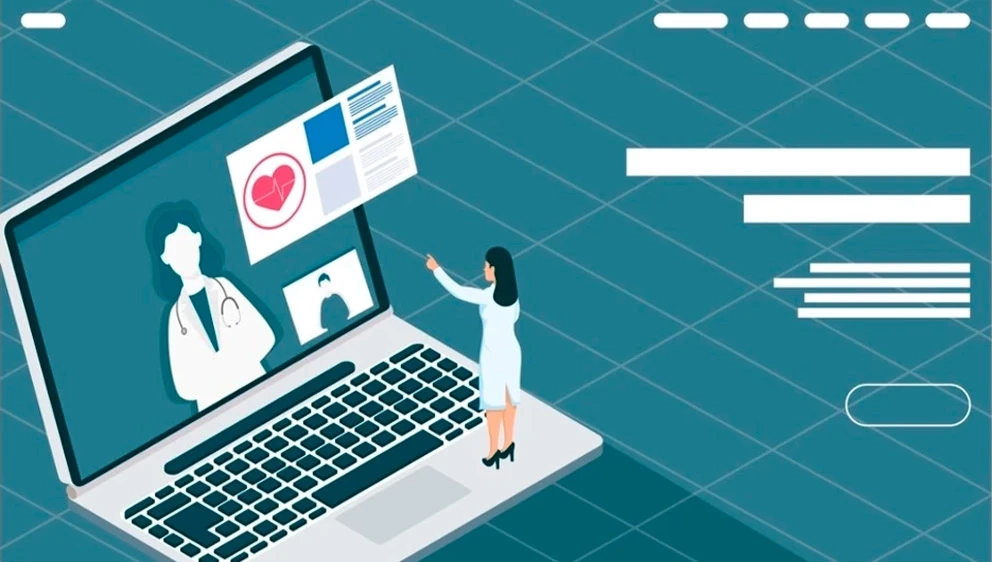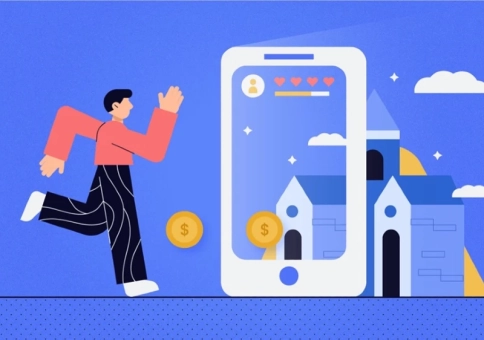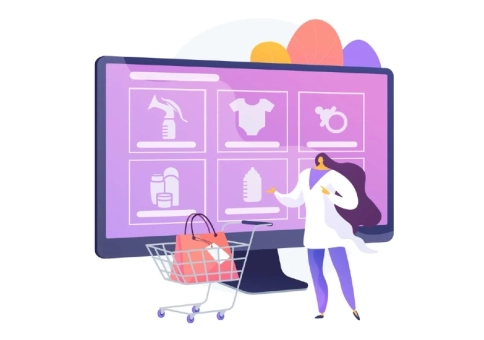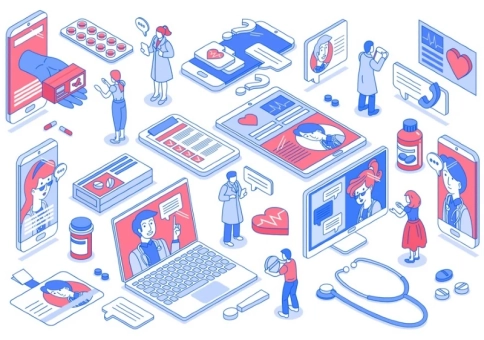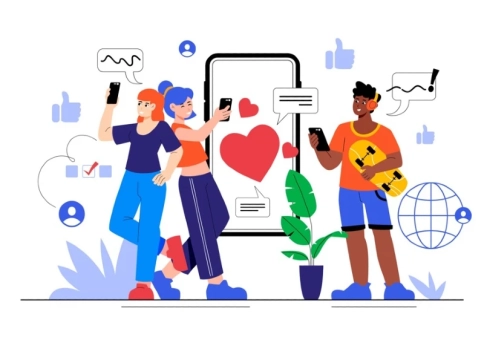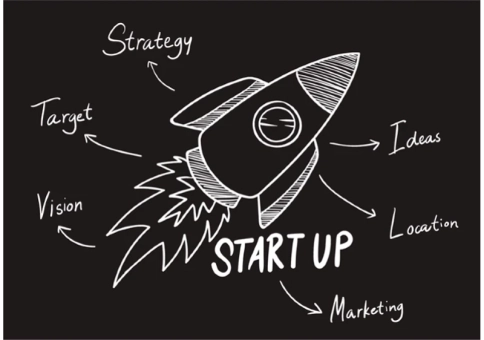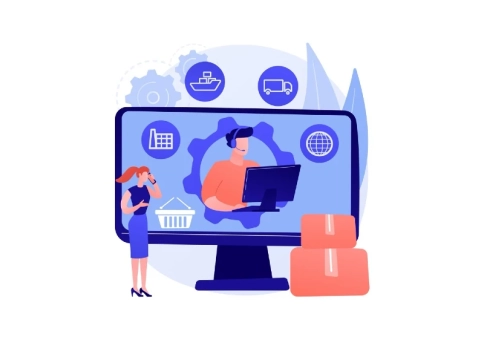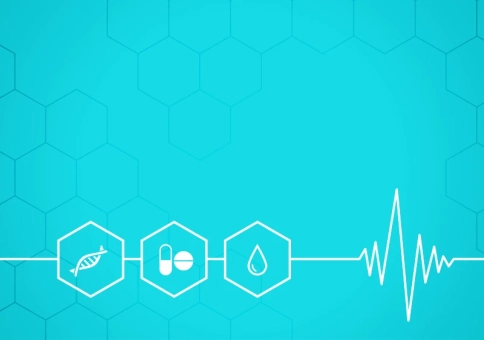The Future of Healthcare App Development
In the rapidly evolving world, technology has become an integral part of almost every aspect of our lives, and healthcare is not an exception. The rise of healthcare app development has transformed the way patients and doctors interact, making the process more convenient, accessible, and efficient. In this article, we'll delve into the current state of the mHealth market, research the emerging trends, and explore the ways to make healthcare mobile app development more successful.
Image by pch.vector on Freepik
Current State of the mHealth Market
Before we take a glance into the future, it’s important to understand what the present situation with mHealth is and what you’re going to work with if you decide to push your product into the market. Spoiler: lots of awesome IT solutions for the healthcare industry already exist, but the opportunities for new products are endless. So if we’re talking about jumping on the bandwagon here, there is only half of the band there yet.
Growing Demand for Healthcare Apps
Numbers speak louder than words, so let’s just take a look at the statistics:
- The global mHealth market size was valued at USD 56.8 billion in 2022 and is expected to reach USD 236.2 billion by 2028, registering a CAGR of 24.57% from 2023 to 2028.
- The number of global mHealth users is expected to reach 2.5 billion by 2025.
- The global market for telemedicine is expected to reach USD 240 billion by 2032.
As you can see, the demand for healthcare apps is on the rise, and for good reason. People are more and more seeking digital solutions that can offer them easy access to medical information, virtual consultations, appointment scheduling, and medication management. Respectively, the demand for healthcare software development services is going to be on the rise as well.
Diversity of Healthcare Apps
Healthcare IT solutions come in various forms, catering to different aspects of human well-being. Here are some of the app types users can find on the mHealth market today:
- Fitness and wellness apps. These apps are designed to encourage users to lead healthier lifestyles, offering personalized workout routines, nutrition plans, and activity tracking. A great example is MyFitnessPal, which allows users to log their meals, track their exercise, and set fitness goals to maintain a more balanced lifestyle.
- Telemedicine platforms. Telemedicine apps have gained popularity as a response to the urgent need for remote medical consultations. As they can connect patients and healthcare professionals virtually, these platforms offer convenience and access to medical advice regardless of geographical location. A prime illustration of such an app is Teladoc, which connects users with licensed physicians for online consultations, diagnosis, and prescriptions.
- Medication management apps. Managing your medications can be hard, especially if you’ve got a lot of pics to take. The apps streamline the process by providing reminders to take medications, tracking doses, and facilitating medication refills. One of the nice examples is the Medisafe app, but the choice is wide.
- Symptom checkers. Symptom checker apps empower users to assess their symptoms and determine potential health conditions. These apps offer insights into whether medical attention is required and provide recommendations for the next steps. An instance of such an app is Ada, which utilizes AI to analyze symptoms and provide personalized health assessments.
- Mental health apps. The mHealth market is not just about physical health. Such apps help users improve their mental well-being by offering meditation, mindfulness exercises, stress management techniques, and access to mental health professionals. Headspace is a popular example that offers guided meditation sessions and tools to enhance mental resilience and alleviate stress.
- Women's health apps. Catering to women's health needs, these apps track menstrual cycles, ovulation, pregnancy, and offer insights into fertility. If you look into a woman’s phone, you’ll most likely find Flo or Clue — comprehensive apps that not only track menstrual cycles but also provide information about women's health and pregnancy.
- Chronic disease management apps. Designed for individuals living with chronic conditions such as diabetes, hypertension, or asthma, these apps assist in tracking symptoms, monitoring vital signs, and managing medication schedules. For instance, the Glucose Buddy app helps users with diabetes track their blood sugar levels, meals, and medications.
- Emergency response apps. These apps provide crucial information during emergencies, including first aid instructions, emergency contacts, and nearby healthcare facilities. An illustrative app in this category is First Aid American Red Cross, which provides step-by-step instructions for handling all kinds of medical emergencies.
…and this is just a part of the list. Each of these app types serves a unique purpose, contributing to a holistic approach to health management. Whether users are seeking virtual medical consultations, mental health support, or tools for chronic disease management, healthcare software developers offer tailored solutions to meet their specific needs.
Image by macrovector on Freepik
Impact of COVID-19
The COVID-19 pandemic created a seismic shift in the healthcare landscape, completely changing the way we see medical apps. The global crisis triggered an unprecedented demand for digital solutions and healthcare software development, reshaping how healthcare was accessed, delivered, and managed. Key ways in which COVID-19 influenced healthcare app adoption include:
- Virtual care surge. Lockdowns and distancing measures fueled a surge in telemedicine apps, enabling remote medical consultations and diagnostics.
- Remote monitoring. Apps with remote monitoring capabilities facilitated real-time symptom tracking and data sharing with healthcare providers.
- Contact tracing. Contact tracing apps utilized Bluetooth technology to identify potential virus exposure, aiding in containment efforts.
- Health information. Reliable apps disseminated accurate COVID-19 information, combating misinformation and promoting public health measures.
- Innovation acceleration. The crisis spurred rapid innovation, resulting in new apps for vaccine tracking, at-home testing, and mental health resources.
And while the pandemic is finally over, a lot of these apps are here to stay. The COVID-induced transformation demonstrated the resilience of the healthcare industry and the vital role of healthcare apps in providing accessible and efficient medical services.
Emerging Trends in Healthcare App Development
Now that we’re done with the past and present of healthcare mobile app development, it’s time to take a look at its future — and it’s a bright one we must say. Here are some of the industry trends that we can see emerging. If you’re looking for a healthcare software development company, opt for people who can implement at least some of these.
Telemedicine Revolution
Telemedicine apps are revolutionizing how accessible healthcare services are. Through secure video consultations, patients can consult medical professionals remotely, wherever they are. Such apps reduce waiting times, offer a lifeline for individuals with limited mobility or residing in remote areas, and allow access to all kinds of experts while reducing (or we’d better say eliminating) travel and accommodation costs. While there are already several popular telemedicine apps on the market, there is lots of space for improvement in terms of functionality.
AI and Data Analytics
When AI and data analytics join healthcare apps, things get better for patients. These tech tricks look at lots of information to find patterns, predict how diseases might get worse, and suggest treatments made just for you. AI chatbots give quick medical info, and smart machines help doctors figure out tough health problems, making care even better.
Wearable Health Tech
Wearable devices, seamlessly linked to healthcare apps, are already revolutionizing health monitoring, and this revolution is not going to stop soon. Wearables can provide real-time data on vital signs, physical activity, and sleep patterns. Healthcare apps aggregate this information to offer insights into health trends, allowing users and healthcare providers to make informed decisions about well-being and medical interventions.
Blockchain for Data Security
When it comes to healthcare software engineering, data privacy and security are one of the first concerns for users. And this is where blockchain technology might help. It ensures the immutability of patient data, fostering trust between patients and healthcare providers. Decentralized data storage minimizes the risk of breaches, boosting patient confidence in sharing sensitive health information and ensuring the integrity of medical records.
Virtual Reality (VR) in Therapy
Virtual Reality is ushering in a new era of mental health treatment. VR-based therapies expose individuals to controlled environments to address anxiety, phobias, and PTSD. Such immersive experiences can provide a safe space for therapeutic interventions, allowing patients to confront and manage their mental health challenges in a controlled and supportive setting.
Health IoT (Internet of Things)
The Internet of Things (IoT) is changing how we watch over patients. Apps that use IoT gather data all the time from things like smartwatches, glucose monitors, and blood pressure devices. This information helps doctors catch problems early, act quickly, and create treatments that work best for each patient.
Focus on Preventive Care
These days, healthcare apps are focused on helping individuals maintain a healthier lifestyle instead of only reacting when things go wrong. They offer customized exercise plans, nutritional advice, and assessments of potential health risks. By motivating users to adopt healthier habits, these apps aim to relieve pressure on healthcare systems and encourage long-term well-being.
Personalized Patient Experience
Healthcare apps are getting personal. They use patients’ health information to create experiences, treatment plans, and suggestions that perfectly match their needs. This way, patients are happier with their healthcare, more likely to stick to the treatment plans and build a better connection with their healthcare provider.
Image by studiogstock on Freepik
Overcoming Challenges
Creating healthcare apps is a promising venture, but it's not without its obstacles. A healthcare app development company will most likely face some of these challenges, and it’s better to be prepared than stumbled.
Regulatory Compliance
Building healthcare apps means dealing with rules and regulations — a lot. Making sure the app meets industry standards and privacy laws, like the Health Insurance Portability and Accountability Act (HIPAA) in the United States, is a must. To handle all these rules, developers should work closely with experts who know healthcare regulations. Keeping up with constantly evolving rules is important to make sure the app gets approved and gains the trust of the users.
Data Privacy Concerns
In a time when privacy matters a lot, taking care of sensitive health information is a big deal. Healthcare IT solutions providers must prioritize data security and implement robust encryption mechanisms that prevent unauthorized access to patient data. Secure authentication methods, like two-factor authentication, should be integrated to ensure that only authorized individuals can access the app and its data. Transparent data usage policies must be clearly communicated to users, ensuring they understand how their information will be used and shared.
Integration with Existing Systems
Healthcare systems often have complex legacy components that need to work seamlessly with new applications. Integrating new healthcare apps with existing systems requires meticulous planning. Developers should adopt standardized protocols and APIs to ensure compatibility between different systems. By spending time to really understand how old systems work and using tech that helps them fit together, developers can make sure things go smoothly for patients and healthcare providers.
Image by vectorjuice on Freepik
Healthcare App Development Services From Fetocan
Here at Fetocan, we want to shape the future of healthcare with functional and user-friendly apps. We are a custom healthcare software development company that creates innovative, reliable, and secure products. With us, you'll experience:
- Expertise you can trust. We're pros in Android healthcare application development and medical iPhone app development.
- User-friendly solutions. Our apps are made simple, so users can easily manage their health on the go.
- Cutting-edge technology. We use the latest tech to bring you apps that are fast, secure, and up-to-date.
- Data security. Users’ health info is safe with us. We prioritize keeping the data private and secure.
With Fetocan, health and quality are our priorities. Join us in this digital health revolution and experience a healthier future, one app at a time.

